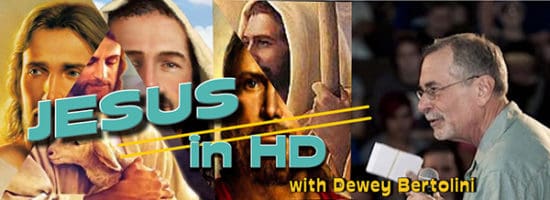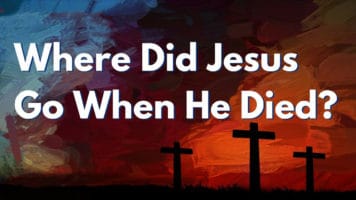
A (Not-So) Silent Saturday
It is one of the most enigmatic statements in all of Scripture.
Ironically, as you are about to hear in this PODCAST, this mysterious statement follows one of the clearest, most-unambiguous and glorious proclamations in all of Holy Writ.
Two statements–one perplexing, one perfectly understandable–both written by our old friend Peter.
Timely statements each, given that the Easter season is upon us.
Two statements that beg us to answer two compelling questions:
- Where did Jesus go during the hours between Friday night and Sunday morning?
- What did Jesus do during those hours between His crucifixion and resurrection?
My friends, you are about to hear an amazing story seldom talked about precisely because it is so enigmatic—“difficult to interpret or understand; mysterious.”
Words that, when understood properly, bless our lives immeasurably.
You are in for a treat.
Let’s begin with the words that Peter told to Cornelius in Acts 10:
34 Then Peter replied, “I see very clearly that God shows no favoritism. 35 In every nation he accepts those who fear him and do what is right. 36 This is the message of Good News for the people of Israel—that there is peace with God through Jesus Christ, who is Lord of all. 37 You know what happened throughout Judea, beginning in Galilee, after John began preaching his message of baptism. 38 And you know that God anointed Jesus of Nazareth with the Holy Spirit and with power. Then Jesus went around doing good and healing all who were oppressed by the devil, for God was with him.
39 “And we apostles are witnesses of all he did throughout Judea and in Jerusalem. They put him to death by hanging him on a cross, 40 but God raised him to life on the third day. Then God allowed him to appear, 41 not to the general public, but to us whom God had chosen in advance to be his witnesses. We were those who ate and drank with him after he rose from the dead. 42 And he ordered us to preach everywhere and to testify that Jesus is the one appointed by God to be the judge of all—the living and the dead. 43 He is the one all the prophets testified about, saying that everyone who believes in him will have their sins forgiven through his name.”
44 Even as Peter was saying these things, the Holy Spirit fell upon all who were listening to the message. (Acts 10:34-44)
And now for Peter’s clear and unclear statements which augment his message to Cornelius:
18 Christ suffered for our sins once for all time. He never sinned, but he died for sinners to bring you safely home to God. He suffered physical death, but he was raised to life in the Spirit.
19 So he went and preached to the spirits in prison— 20 those who disobeyed God long ago when God waited patiently while Noah was building his boat. (1 Peter 3:18-19)
What?!
So, as Peter preached to Cornelius and his household, Jesus was put to death on a cross, as prophesied and rose again on the third day. But, where did He go between the hours of Friday night and Sunday morning, and what did He do during that time? According to Peter, He preached to the spirits “in prison”… those who were living in disobedience to God’s will, dating all the way back to the days of Noah.
Now, even the greatest of Biblical scholars maintain that concurrence eludes us today. The words in Peter’s letter can be translated in various ways, resulting in, basically, at least three different conclusions as to what occurred during those hours as Jesus’ body laid dead in the tomb.
View #1: The spirits referred to were wicked men living in Noah’s day who had rejected Noah’s preaching. They drowned in the flood, and their souls were imprisoned in hell.
View #2: The “son’s of God” mentioned in Genesis, who lived in Noah’s day, represented the lineage of Seth who turned away from God and married the descendants of Cain… supremely wicked men who married supremely wicked women and created a line of individuals who were known as “the fallen ones”. Some say that immediately after the crucifixion, Jesus went to hell and visited these people’s souls to either offer them the opportunity to repent and/or to declare victory over their attempts to thwart God’s plans to redeem mankind.
View #3: It appears that some of Satan’s “angels” took on human form, much as Satan took on the form of a serpent, and seduced human women, producing a race of giants. In response, God sent the flood and cleansed the earth. It was to these evil beings that Jesus preached to on what we know as “Silent Saturday”, proclaiming His victory!
Now, personally, I do not subscribe wholly to any of these three views.
I believe that the days of Noah were unprecedented in regards to the levels of evil that was spread across the planet. I don’t think we have seen anything like it since, nor will we until the Day of Judgment. I believe that there were supremely wicked men who rose to positions of prominence in the world, and their rebellious stances toward God opened them up to demonic possession… possession by once holy, but fallen angels. I believe these are the “sons of God” that we read about in Genesis 6. These demon possessed men produced a terrible race that were so horrible that they led God to send the great flood. And, immediately, upon Jesus’ death on the cross, He first escorted the thief that died on Calvary with Him into paradise; and then visited these eternally chained demons, whose strategy was to possess the men in Genesis 6 and pollute the entire human race so that the Son of God could never be born, and announced His eternal victory: It is finished!
It turns out, that Saturday was not so silent after all!